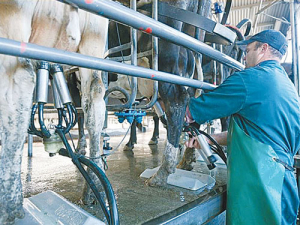Calf rearers say goodbye to leaky teats, poor feeder fit
Leaky teats and poor feeder fit are now a thing of the past for calf rearers - thanks to the Thriver range of calf teats from Skellerup.
 Halving bulk milk somatic cell counts from 300,000 to 150,000 is estimated to increase total season milksolids by 2.1%.
Halving bulk milk somatic cell counts from 300,000 to 150,000 is estimated to increase total season milksolids by 2.1%.
Filling the vat with the best milk you can produce is a financial advantage, says milking liner maker Skellerup.
Studies have shown hefty production gains from maintaining good milk quality, the company says. For example, halving bulk milk somatic cell counts (BMSCC) from 300,000 to 150,000 is estimated to increase total season milksolids by 2.1%
In general, the lower your somatic cell count (SCC) and the fewer grades incurred during lactation, the more efficient and thorough is your milking process.
Attention to detail and a preventative approach go a long way towards improving milk quality, and this is the ideal time of year to review your system, says Skellerup. A key question to ask is: when did we last replace the liners?
Milking liners are the one item in direct contact with the cow. During each lactation she typically spends 50-100 hours attached to the machine, via those liners.
“Milking liners are hidden inside the shells, so you can’t see what happens to them when they wear out,” says Skellerup national manager Perry Davis.
“The first thing you might see instead is a cow kicking the cluster off, damaged teat ends or a surprisingly high BSCC on the milk docket.”
Worn, poor-fitting liners can leave milk in the udder, slip off the teat and/or leave permanent rings at the top of the teat. And any internal cracks in the rubber are an ideal environment for bacteria.
Skellerup offers an easy way to check if milking liners are due for replacement: go to www.2500change.co.nz and fill in the required fields or use a calculator to work out how many times they’ve been used since they were installed.
If it’s 2500 or more, it’s time to change, Davis says.
Donald Trump's latest tariff tantrum has again thrown the world of trade into a new round of turmoil and uncertainty, and NZ is caught up in it.
The third edition of the NZ Dairy Expo, held in mid-February in Matamata, has shown that the KISS principle (keep it simple stupid) was getting a positive response from exhibitors and visitors alike.
Twenty years ago, South African dairy farm manager Louis Vandenberg was sent to a farm in Waikato to provide training on Afimilk technology.
Strong farmgate milk price is helping boost investment on farms, says PGG Wrightson chief executive Stephen Guerin.
Fonterra's 460 milk suppliers in Australia, who will switch to Lactalis end of this month, are unfazed with the impending change.
The 5+ A Day Charitable Trust has launched a collection of affordable recipes designed to turn everyday vegetables into seasonal stars.
OPINION: Is it a case of over promising and under delivering? Farmers think so.
OPINION: The UK dairy industry is celebrating a win after plant-based drink maker Oatly lost a long-running legal battle over…